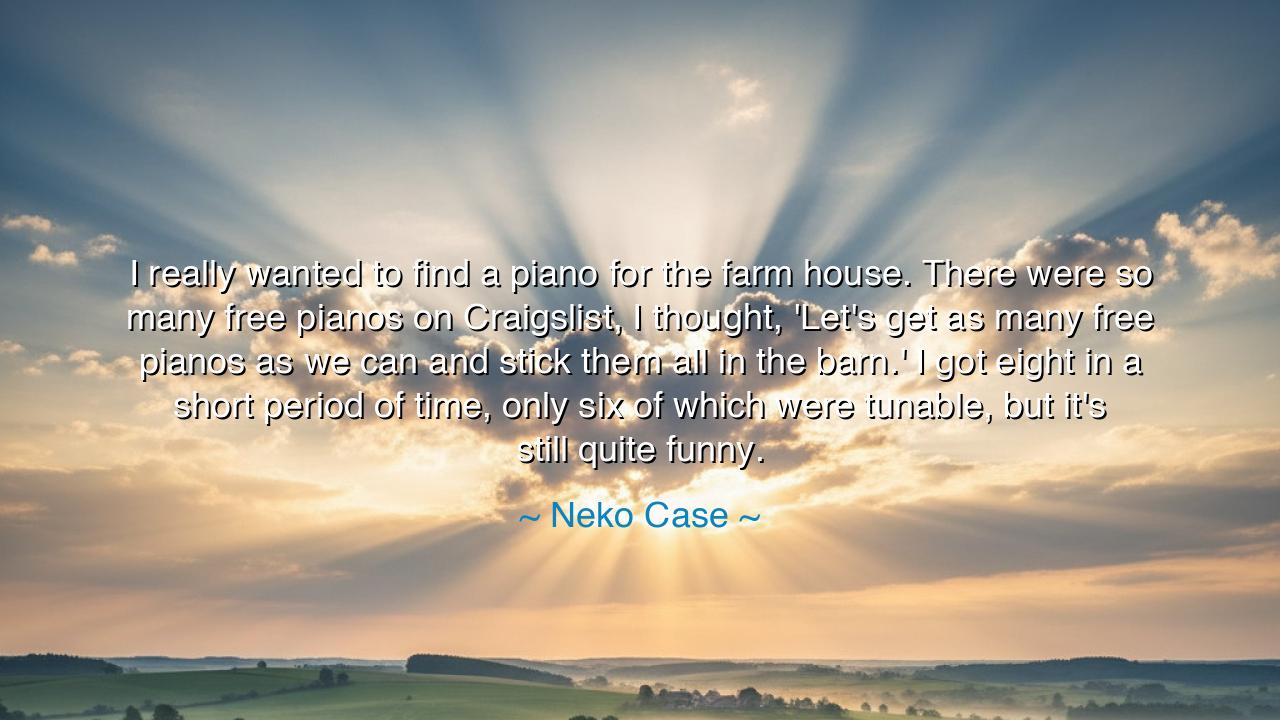
I really wanted to find a piano for the farm house. There were so
I really wanted to find a piano for the farm house. There were so many free pianos on Craigslist, I thought, 'Let's get as many free pianos as we can and stick them all in the barn.' I got eight in a short period of time, only six of which were tunable, but it's still quite funny.






“I really wanted to find a piano for the farmhouse. There were so many free pianos on Craigslist, I thought, ‘Let’s get as many free pianos as we can and stick them all in the barn.’ I got eight in a short period of time, only six of which were tunable, but it’s still quite funny.” Thus spoke Neko Case, the singer-poet whose voice carries the wild ache of open plains and the tenderness of solitude. Her words, while humorous on the surface, conceal a deeper truth about the human spirit: our endless desire to gather beauty, even when that beauty is imperfect; our yearning to fill empty spaces—whether barns or hearts—with music.
At first, her story seems lighthearted, almost whimsical: a barn full of mismatched, weathered pianos, each with its own crooked voice. Yet within this simple image lies something profound. For Neko Case, the act of collecting these pianos was not mere excess—it was an expression of wonder, of creativity without restraint. The farmhouse and the barn are symbols of stillness and work, of the place where one labors and one dreams. By filling them with music, she was filling her world with echoes of emotion, history, and human hands. Each piano, though aged or broken, held stories in its strings. To gather them was to honor the beauty in imperfection.
The ancients too knew this impulse—the urge to collect fragments of meaning and to build sanctuaries of the soul. The philosopher Epicurus tended a humble garden, not for riches or fame, but to cultivate peace in simplicity. The poet Sappho, on the isle of Lesbos, gathered her songs as one might gather flowers—some wilted, some wild, all luminous. Likewise, Neko’s barn became a temple of sound and laughter, filled with instruments that may not all be tunable, yet each still capable of whispering a note of truth. What is funny, as she says, is not foolish—it is joyful. It is the laughter of one who has embraced imperfection and found delight in it.
For in life, not all things will play in harmony. We may seek eight pianos, yet only six will sing. The other two may be silent, stubborn, or broken—but even they have their purpose. Their presence reminds us that the world is never fully in tune, and that creation often lives side by side with disarray. The funny part is not that the plan failed, but that the beauty endured nonetheless. To laugh at such moments is to accept the natural rhythm of existence—to find poetry in the crooked key, and joy in the unplanned.
Neko’s tale, though wrapped in humor, is also a quiet rebellion against the modern hunger for perfection. She did not seek a pristine concert piano; she sought many, simply because they were free, available, and full of character. This is the wisdom of the artist: to see value where others see waste, to find music in the discarded. The ancients would have called this areté—the excellence of the soul, the capacity to make meaning from the ordinary. For the barn filled with pianos is not absurd—it is sacred, because it testifies to the boundless nature of curiosity and play.
Let us then learn from this gentle parable: fill your own “barn” with what brings you life, even if it does not all fit neatly or function perfectly. Gather beauty wherever you find it—whether it be an untuned instrument, an unfinished dream, or a friendship that makes you laugh. Do not wait until every note is right; play what you have, and let the imperfections become part of the song.
So, dear listener, when you next walk through your own quiet spaces, remember the image of Neko Case’s barn of pianos—a place of humor, imperfection, and abundance. Seek what is meaningful, not what is flawless. Embrace the funny, the mismatched, the human. For it is in such gatherings of imperfection that life’s deepest melodies are written—not in the concert hall of control, but in the barn where every key, even the broken one, still has a voice.






AAdministratorAdministrator
Welcome, honored guests. Please leave a comment, we will respond soon